On December 22nd, LeTV held the "Super Qu Speed" new product launching conference in Beijing. Based on the globally-opened closed-loop Le Le ecosystem, the company officially launched the world's first surrogate Super TV 4th generation Super TV Max65 Curved (Super 4 Max 65 Curved ) As well as the world's first glass lightguide ultrathin smart TV super 4 Max70, once again subvert the entire Chinese television industry.
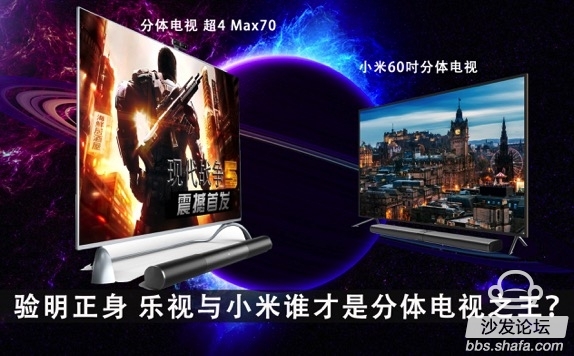
At present, LeTV in the smart TV field has become the target of many TV companies. This point we can see from the appearance rate of LeTV in its “Friendship Business†conference. When Xiaomi released split TV, Xiaomi even had his own newest product started to compete with LeTV's products one year ago. This is really unpredictable. Over the past few years in the field of smart TV, Xiaomi has been completely suppressed by LeTV. It is worthwhile to understand the point by using new technologies. However, there are some unsatisfying practices.
In the exclusive interview of the “Super Qufu†new product launch conference, the on-site media mentioned that the difference between the two new Super TVs launched by LeTV and Xiaomi’s previously launched 60-inch split TV attracted everyone’s attention. As LeTV once again subverted the entire television industry's new products, which in the end is the difference between TV and millet split TV? Because Super 4 Max Curve is a curved screen, Xiao Bian in line with the principle of fairness and justice to get 70 inches Super TV - Super 4 Max70 and Xiaomi's top 60-inch split TVs are compared in depth in terms of appearance, hardware, own content, and system.
One: Appearance Competition
The first is to compare the product technology of the two parties. Although both the Super 4 Max70 and the Xiaomi TV 360 have adopted the all-metal process, there is a big difference in the details of the products. Millet TV 3 60 å‹ fuselage used in every metal splicing technology, there is a gap between the oblique angle between the fuselage and the screen, easy to dust, and the body has a sharp corner, easy to make people scratch. The double T-shaped base is still used on the base design, and there is no change compared to the previous product.
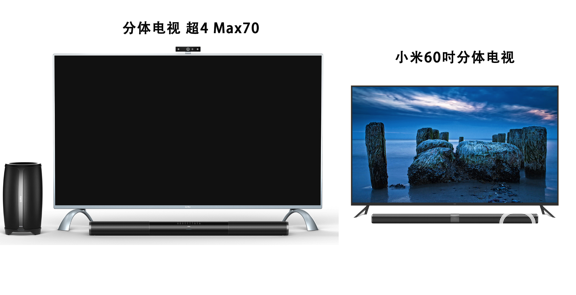
On the other hand, the Super 4 Max70 body adopts the integrated rounded fillet design of metal seamless bending, which has no edges and corners to be safe and reliable, and prevents the user from being injured during use. A completely new design was made on the pedestal to integrate the cloud wave base, which greatly improved the aesthetics of the product. In addition, self-locking screws are used to fix the base, which simplifies the user's cumbersome procedures during installation. In the thickness of the product, the millet TV 60 is the thinnest at 11.63mm, and the thinnest at the Ultra 4 Max70 is 9.9mm. In this era of ultra-thin ultra-thin, the Ultra 4 Max70 is at the forefront.

If the appearance of the two products are presented in a scoring manner, Xiaobian gives the Super 4 Max70 with a total score of 28 points, while the Xiaomi TV 60 points has a score of 24 points. From the score sheet, it is believed that the users can watch. It is obvious that the superiority of 4 Max70 over the three aspects of appearance design, degree of innovation, and product safety is obvious.
Two: Hardware Competition
Since LeTV entered the television industry, the hardware revolution of the TV industry has kicked off. Ever since, both the Internet TV companies and the traditional enterprises have advertised their hardware configuration among the best in the industry, but the fact is often communicated with With certain differences, then what is the hardware configuration of the Super 4 Max70 compared to the Millet TV 60? Next, let us look at the actual comparison.

Leaving aside the difference in screen size, LeTV uses Sharp's original SDP panel with Corning IrisTM Glass on the new Super 4 Max70 with a color gamut of 85% and 120Hz refresh rate. Through the Novatek 72324 professional FRC chip (movement detection compensated MEMC technology image processing chip) to effectively solve the phenomenon of trailing afterimage, dynamic contrast ratio up to 4000:1, response speed of 6.5 milliseconds.
And millet is using LGD 4K 2D screen, color gamut up to 85%, with 60Hz refresh rate. Match with 6M60 image processing chip to ensure that users can see the real picture experience. Dynamic contrast up to 1200:1, response speed 8 ms.
Next, compare the smart core components of these two split TVs.
LeTV's concept of split TV is not to split the design for the pursuit of "splitting". For example, the smart home center will support the access of more intelligent home devices in the future, and Letv Smart Home Center can work independently from the screen. Millet can't work without TV screen.
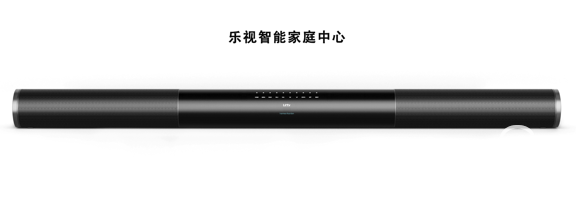
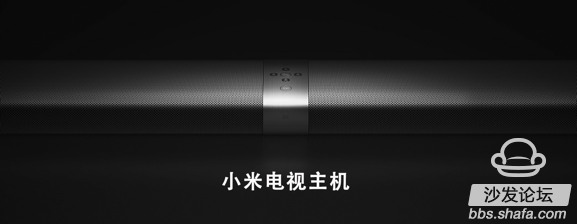
LeSmart Home Center first applied the 64-bit processor Qualcomm Snapdragon APQ8094 to TV products. The 8-core 1.8GHz speed is suffocating fast. The Adreno 430 GPU has comparable game console performance, 4GB of ultra-large running memory and 32GB/64GB of high-speed flash memory. , Can easily run large 3D games and 4K HD video, support 3D features. The Xiaomi host has MStar 6A928 processor clock processor, 4 core CPU + 4 core GPU and 2GB + 8GB memory does not support 3D function.
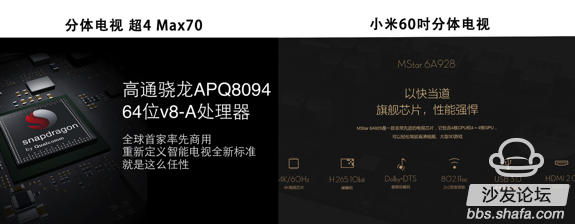
In addition, there are differences between the soundbars of the two products. The LeTV Smart Home Center uses a Manhattan (full-featured) sound card. Through the adjustment of the Manhattan Audio Engineer, a ferrite magnet midrange unit is used to design the sound accurately and stably. The millet host is using Dolby sound to improve the sound quality, although it can not be said that Dolby sound is not good, but the current Harman Kardon sound effects are mostly used in BMW, Mercedes-Benz and other high-end products. In addition, the Harman Clari-Fi technology provided by Harman Kardon can restore compressed music to near-destructive audio.

In addition, unlike the Xiaomi host, the LeSco smart home center can be powered by an independent analog 5.1 stereo, and a near-field-sensing backlit touch key is set on the body, which can be used without a remote control. In addition, the soundbar of the Smart Home Center can be used alone. This is what Xiaomi can't do. Millet host soundbar must light up the screen, can only be used through the switch cable, and soundbar and TV must also be open at the same time, for users who just started to contact smart TV, some cumbersome. And the subwoofer for the Xiaomi TV host needs to be purchased separately, while the subwoofer for the LeTV smart home center is standard.
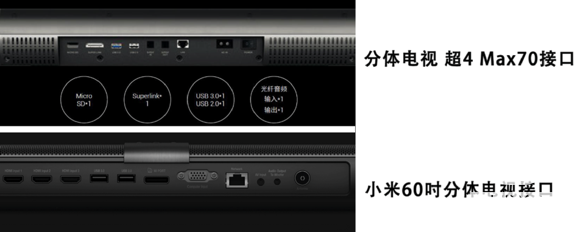
In terms of interface configuration, the Super 4 Max70 is better than the Millet TV 60-class USB 3.0 interface, SD card slot, and optical audio output interface. The user-prepared interface is sufficient to achieve the best scalability of LeTV, such as the top The USB 3.0 interface can be used to connect a somatosensory camera, a super gun king, and to decode video and audio files.
In addition, the extra SD card slot can expand the physical memory of the Super TV, and more fiber interfaces can output lossless audio source code. In addition, LeTV has applied two-way Bluetooth technology to the smart home center, which can receive signals and send signals.
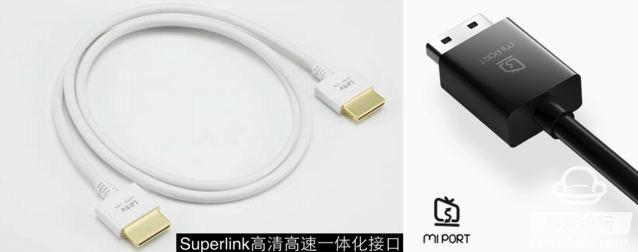
The two products with the same split TV have different product line adaptations. The Levision Smart Home Center provides users with an exclusive high-definition and high-speed integrated SuperLink cable. The overall white design can be integrated into the wall surface. One, can support the top USB3.0 transmission work, set transmission audio, video, control commands in one. The integration of the Mi Port power supply principle used in Xiaomi's TV host system has a certain degree of security risk. The black line cannot be integrated with the wall, and does not support USB3.0 transmission.
Three: own content competition
It is especially important for the user to see what the content of the TV is rich, especially the contents of the TV itself. LeTV and Xiaomi have always been public in their content, saying that public-private women are reasonable and reasonable, but they have a fair mind. Today Xiao Bian will press the contents of the two companies to make a ruling for everyone.
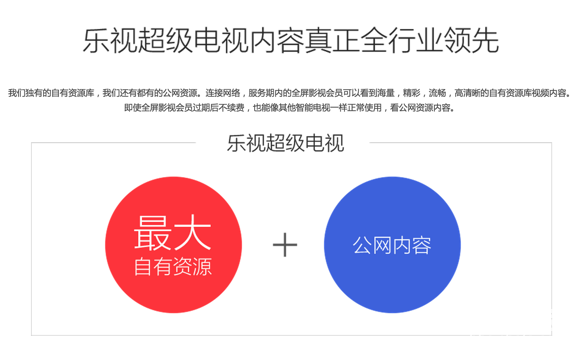
If we are more content than the content we are sure to, LeTV and Xiaomi have different ideas in the matching of content. LeTV owns Huafan Film and Television, LeTV, LeTV Sports, LeTV, LeTV Music, Copyright Purchasing. Content agencies. Xiaomi does not have any advantage in this regard. The content is zero. The content owned by Xiaomi is acquired through shares through video alliance. This is not considered as its own content. Even if the content is rich, it is also content of the public network. Everyone can enjoy these services for money. And popular TV dramas like "Yueyue Biography" can only enjoy genuine effects on LeTV.

Some people may say that Xiao Bian’s argument is too extreme, but I believe that everyone will calm down and find that the accumulation of content in the form of video alliances has collapsed at any time. This alliance is unstable and unreliable, and only has powerful self. Having content allows users to experience true content services.
Four: System Competition
Mentioned that many people in the MIUI system is not unfamiliar, with the outstanding influence of Xiaomi mobile phone, MIUI has now become an intelligent system that is deeply loved by 100 million users. But attentive users will find that it hasn't changed much since its introduction. In the current version, Xiaomi TV 3 only adds voice capabilities. In addition there is no other characteristic at all.

On the contrary, the EUI system provided by LeTV is currently composed of six desktops: smart applications, video recommendations, carousel desktops, search desktops, video sources, and children's desktops. It is based on Levision's powerful video library and its unique network LIVE desktop and network. The search desktop of the video heart search, the convenient and fast signal source desktop broadcast interactive locks all the highlights for you. In addition, LeEui EUI also supports rich multi-screen interaction, voice input/control, cloud services and other functions, which can be fully enjoyed in all LeTVs.
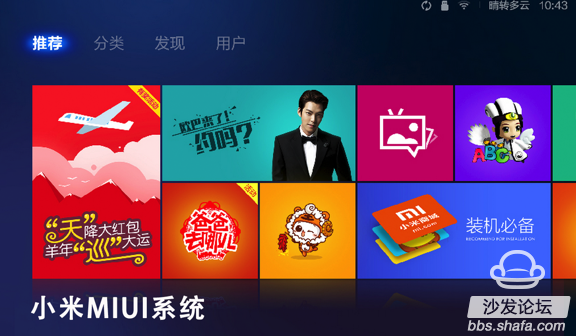
If we compare the features of the Super 4 Max70 and Xiaomi TV 60-inch systems, it seems that we can only find new voice features in Xiaomi TV, and there are no bright spots in other areas. In contrast, the Super 4 Max70 EUI system has many features, such as far talk voice 2.0 features, gesture / bone somatosensory technology, the top of the USB3.0 interface, live desktop, 4K own content resources, etc. This is unmatched by Xiaomi.

In addition, the biggest difference of the EUI system in MIUI is that EUI pioneered multi-type desktops, and realized the first time stream of consciousness flow interaction, allowing users to get what they want and fully realize the content desktopization and application, video, sports, games, shopping, Music and other diverse contents are desktops and can be operated on a centralized basis to allow different groups of people to have dedicated content desktops. All super TVs support OTA upgrades. Previously, the children's desktop has been on the line, and there will be follow-up game desktops and shopping desktops that will continue to land LeTV.
to sum up:
From the comparison between Super 4 Max70 and Xiaomi TV 60, from the five aspects of TV appearance, hardware, own content, and system competition, Xiaobian can feel the superiority of Super 4 Max70 is very obvious. In the victory record.
Summary one: In the process, the metal seamless bending one-piece molding technology is higher than the millet television 60. Especially in the humanized design, the rounded design makes the border of the TV beautiful, and adds security. Sex.
Summary 2: In the hardware competition, Super 4 Max70 with superior hardware performance, as well as the top hardware configuration monopoly, especially in the details of the product, Leshi Smart Home Center (Smart Home Center) can be simply applied to other On TV products, and through Harman Kardon can bring top-end audio and video experience for users.
Summary 3: In terms of its own content, Xiaomi’s content is zero. LeTV, on the other hand, has a powerful content supply chain, including Huaer Film and Television, LeTV Film, and LeTV Sports, and can provide users with rich content experiences whenever and wherever they want.

At present, LeTV in the smart TV field has become the target of many TV companies. This point we can see from the appearance rate of LeTV in its “Friendship Business†conference. When Xiaomi released split TV, Xiaomi even had his own newest product started to compete with LeTV's products one year ago. This is really unpredictable. Over the past few years in the field of smart TV, Xiaomi has been completely suppressed by LeTV. It is worthwhile to understand the point by using new technologies. However, there are some unsatisfying practices.
In the exclusive interview of the “Super Qufu†new product launch conference, the on-site media mentioned that the difference between the two new Super TVs launched by LeTV and Xiaomi’s previously launched 60-inch split TV attracted everyone’s attention. As LeTV once again subverted the entire television industry's new products, which in the end is the difference between TV and millet split TV? Because Super 4 Max Curve is a curved screen, Xiao Bian in line with the principle of fairness and justice to get 70 inches Super TV - Super 4 Max70 and Xiaomi's top 60-inch split TVs are compared in depth in terms of appearance, hardware, own content, and system.
One: Appearance Competition
The first is to compare the product technology of the two parties. Although both the Super 4 Max70 and the Xiaomi TV 360 have adopted the all-metal process, there is a big difference in the details of the products. Millet TV 3 60 å‹ fuselage used in every metal splicing technology, there is a gap between the oblique angle between the fuselage and the screen, easy to dust, and the body has a sharp corner, easy to make people scratch. The double T-shaped base is still used on the base design, and there is no change compared to the previous product.

On the other hand, the Super 4 Max70 body adopts the integrated rounded fillet design of metal seamless bending, which has no edges and corners to be safe and reliable, and prevents the user from being injured during use. A completely new design was made on the pedestal to integrate the cloud wave base, which greatly improved the aesthetics of the product. In addition, self-locking screws are used to fix the base, which simplifies the user's cumbersome procedures during installation. In the thickness of the product, the millet TV 60 is the thinnest at 11.63mm, and the thinnest at the Ultra 4 Max70 is 9.9mm. In this era of ultra-thin ultra-thin, the Ultra 4 Max70 is at the forefront.

If the appearance of the two products are presented in a scoring manner, Xiaobian gives the Super 4 Max70 with a total score of 28 points, while the Xiaomi TV 60 points has a score of 24 points. From the score sheet, it is believed that the users can watch. It is obvious that the superiority of 4 Max70 over the three aspects of appearance design, degree of innovation, and product safety is obvious.
Two: Hardware Competition
Since LeTV entered the television industry, the hardware revolution of the TV industry has kicked off. Ever since, both the Internet TV companies and the traditional enterprises have advertised their hardware configuration among the best in the industry, but the fact is often communicated with With certain differences, then what is the hardware configuration of the Super 4 Max70 compared to the Millet TV 60? Next, let us look at the actual comparison.

Leaving aside the difference in screen size, LeTV uses Sharp's original SDP panel with Corning IrisTM Glass on the new Super 4 Max70 with a color gamut of 85% and 120Hz refresh rate. Through the Novatek 72324 professional FRC chip (movement detection compensated MEMC technology image processing chip) to effectively solve the phenomenon of trailing afterimage, dynamic contrast ratio up to 4000:1, response speed of 6.5 milliseconds.
And millet is using LGD 4K 2D screen, color gamut up to 85%, with 60Hz refresh rate. Match with 6M60 image processing chip to ensure that users can see the real picture experience. Dynamic contrast up to 1200:1, response speed 8 ms.
Next, compare the smart core components of these two split TVs.
LeTV's concept of split TV is not to split the design for the pursuit of "splitting". For example, the smart home center will support the access of more intelligent home devices in the future, and Letv Smart Home Center can work independently from the screen. Millet can't work without TV screen.


LeSmart Home Center first applied the 64-bit processor Qualcomm Snapdragon APQ8094 to TV products. The 8-core 1.8GHz speed is suffocating fast. The Adreno 430 GPU has comparable game console performance, 4GB of ultra-large running memory and 32GB/64GB of high-speed flash memory. , Can easily run large 3D games and 4K HD video, support 3D features. The Xiaomi host has MStar 6A928 processor clock processor, 4 core CPU + 4 core GPU and 2GB + 8GB memory does not support 3D function.

In addition, there are differences between the soundbars of the two products. The LeTV Smart Home Center uses a Manhattan (full-featured) sound card. Through the adjustment of the Manhattan Audio Engineer, a ferrite magnet midrange unit is used to design the sound accurately and stably. The millet host is using Dolby sound to improve the sound quality, although it can not be said that Dolby sound is not good, but the current Harman Kardon sound effects are mostly used in BMW, Mercedes-Benz and other high-end products. In addition, the Harman Clari-Fi technology provided by Harman Kardon can restore compressed music to near-destructive audio.

In addition, unlike the Xiaomi host, the LeSco smart home center can be powered by an independent analog 5.1 stereo, and a near-field-sensing backlit touch key is set on the body, which can be used without a remote control. In addition, the soundbar of the Smart Home Center can be used alone. This is what Xiaomi can't do. Millet host soundbar must light up the screen, can only be used through the switch cable, and soundbar and TV must also be open at the same time, for users who just started to contact smart TV, some cumbersome. And the subwoofer for the Xiaomi TV host needs to be purchased separately, while the subwoofer for the LeTV smart home center is standard.

In terms of interface configuration, the Super 4 Max70 is better than the Millet TV 60-class USB 3.0 interface, SD card slot, and optical audio output interface. The user-prepared interface is sufficient to achieve the best scalability of LeTV, such as the top The USB 3.0 interface can be used to connect a somatosensory camera, a super gun king, and to decode video and audio files.
In addition, the extra SD card slot can expand the physical memory of the Super TV, and more fiber interfaces can output lossless audio source code. In addition, LeTV has applied two-way Bluetooth technology to the smart home center, which can receive signals and send signals.

The two products with the same split TV have different product line adaptations. The Levision Smart Home Center provides users with an exclusive high-definition and high-speed integrated SuperLink cable. The overall white design can be integrated into the wall surface. One, can support the top USB3.0 transmission work, set transmission audio, video, control commands in one. The integration of the Mi Port power supply principle used in Xiaomi's TV host system has a certain degree of security risk. The black line cannot be integrated with the wall, and does not support USB3.0 transmission.
Three: own content competition
It is especially important for the user to see what the content of the TV is rich, especially the contents of the TV itself. LeTV and Xiaomi have always been public in their content, saying that public-private women are reasonable and reasonable, but they have a fair mind. Today Xiao Bian will press the contents of the two companies to make a ruling for everyone.

If we are more content than the content we are sure to, LeTV and Xiaomi have different ideas in the matching of content. LeTV owns Huafan Film and Television, LeTV, LeTV Sports, LeTV, LeTV Music, Copyright Purchasing. Content agencies. Xiaomi does not have any advantage in this regard. The content is zero. The content owned by Xiaomi is acquired through shares through video alliance. This is not considered as its own content. Even if the content is rich, it is also content of the public network. Everyone can enjoy these services for money. And popular TV dramas like "Yueyue Biography" can only enjoy genuine effects on LeTV.

Some people may say that Xiao Bian’s argument is too extreme, but I believe that everyone will calm down and find that the accumulation of content in the form of video alliances has collapsed at any time. This alliance is unstable and unreliable, and only has powerful self. Having content allows users to experience true content services.
Four: System Competition
Mentioned that many people in the MIUI system is not unfamiliar, with the outstanding influence of Xiaomi mobile phone, MIUI has now become an intelligent system that is deeply loved by 100 million users. But attentive users will find that it hasn't changed much since its introduction. In the current version, Xiaomi TV 3 only adds voice capabilities. In addition there is no other characteristic at all.

On the contrary, the EUI system provided by LeTV is currently composed of six desktops: smart applications, video recommendations, carousel desktops, search desktops, video sources, and children's desktops. It is based on Levision's powerful video library and its unique network LIVE desktop and network. The search desktop of the video heart search, the convenient and fast signal source desktop broadcast interactive locks all the highlights for you. In addition, LeEui EUI also supports rich multi-screen interaction, voice input/control, cloud services and other functions, which can be fully enjoyed in all LeTVs.

If we compare the features of the Super 4 Max70 and Xiaomi TV 60-inch systems, it seems that we can only find new voice features in Xiaomi TV, and there are no bright spots in other areas. In contrast, the Super 4 Max70 EUI system has many features, such as far talk voice 2.0 features, gesture / bone somatosensory technology, the top of the USB3.0 interface, live desktop, 4K own content resources, etc. This is unmatched by Xiaomi.

In addition, the biggest difference of the EUI system in MIUI is that EUI pioneered multi-type desktops, and realized the first time stream of consciousness flow interaction, allowing users to get what they want and fully realize the content desktopization and application, video, sports, games, shopping, Music and other diverse contents are desktops and can be operated on a centralized basis to allow different groups of people to have dedicated content desktops. All super TVs support OTA upgrades. Previously, the children's desktop has been on the line, and there will be follow-up game desktops and shopping desktops that will continue to land LeTV.
to sum up:
From the comparison between Super 4 Max70 and Xiaomi TV 60, from the five aspects of TV appearance, hardware, own content, and system competition, Xiaobian can feel the superiority of Super 4 Max70 is very obvious. In the victory record.
Summary one: In the process, the metal seamless bending one-piece molding technology is higher than the millet television 60. Especially in the humanized design, the rounded design makes the border of the TV beautiful, and adds security. Sex.
Summary 2: In the hardware competition, Super 4 Max70 with superior hardware performance, as well as the top hardware configuration monopoly, especially in the details of the product, Leshi Smart Home Center (Smart Home Center) can be simply applied to other On TV products, and through Harman Kardon can bring top-end audio and video experience for users.
Summary 3: In terms of its own content, Xiaomi’s content is zero. LeTV, on the other hand, has a powerful content supply chain, including Huaer Film and Television, LeTV Film, and LeTV Sports, and can provide users with rich content experiences whenever and wherever they want.